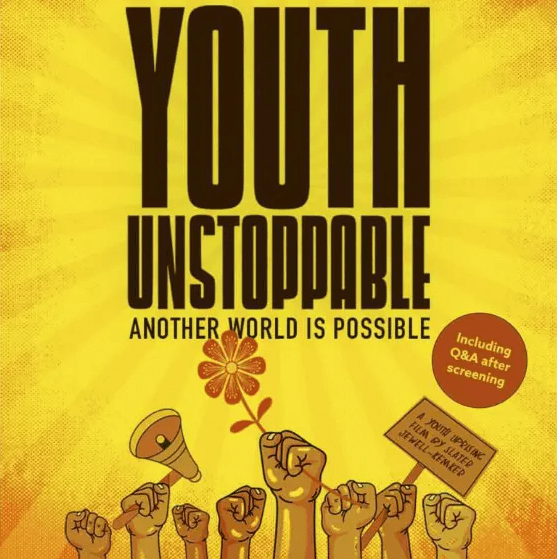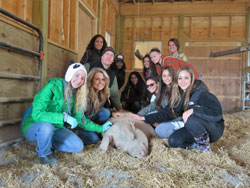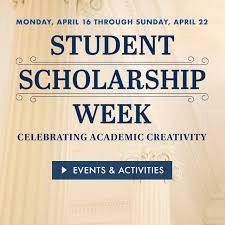On Tuesday, Feb. 6, the Pearson World Cinema Series held a screening of “Last Train Home” in Pollak Theatre as a part of its ongoing annual series.
The Pearson World Cinema Series, which is supported by the Institute of Global Understanding and Monmouth’s Center for the Arts, strives to bring the University a number of both educational and entertaining films. Each showing additionally features a post-viewing discussion and Q&A session hosted by a Monmouth faculty member to help further audience understanding. For “Last Train Home,” the faculty discussion leader was Melissa Bryzcki, Ph.D., Assistant Professor of History and Anthropology and historian of the youth experience in modern China.
“The Pearson World Cinema Series has been around for a number of years, and you’ll notice ads up for the movies on Monmouth’s rotating screens, especially outside Pollak Auditorium,” said Christopher DeRosa, Ph.D., Chair of the Department of History & Anthropology and current Director of the World Cinema Series. “It’s entirely free, you don’t need a ticket, there is plenty of comfy seating, and we always have a faculty member to conduct a discussion with the audience afterward.”
He further explained that the movies chosen are almost always in a language other than English and come from outside of the United States. Every year, the faculty committee for the Series chooses five movies that address a global concern. Last year, the theme was “Life During Wartime,” and this year, the theme is “Global Youth: Agency and Resistance.”
Retired faculty member Thomas Pearson, Ph.D., Professor Emeritus of History and former Provost of the University, and whom the Series’ name honors, began the World Cinema Series in 2003 when Monmouth hosted the Two River Film Festival. Once Monmouth and the Red Bank enterprise were unable to sustain their partnership, the Series continued as the Provost World Cinema Series. The title changed to the Pearson World Cinema Series when Pearson no longer served as the Provost in 2014.
“Part of my philosophy of the whole idea was to give students and faculty a chance to be more humanistic,” Pearson explained. Pearson, since the 1980s, had always used film as an addition to classroom learning during his teaching career. “My philosophy has always been, and continues to be, using film as an educational and entertaining vehicle. The audience can invest in characters and issues, hopefully becoming more empathetic.”
He added, “I did not expect the University to honor me, but it was a really wonderful surprise. My most earnest hope is that the series continues, and that the campus appreciates it. It’s gratifying to see when students and faculty members show up and engage in meaningful discussion.”
DeRosa agreed with the sentiment that film can give viewers insights into differing perspectives and experiences. He said, “One of the joys of good international film is its ability to transport us outside our own milieu and immerse us in a foreign one, with the invitation to try to see this new setting through the eyes of protagonists with whom we share human aspirations but different formative experiences. Viewing with critical judgment, we gain both knowledge and empathy: at Monmouth, that is what we refer to as ‘global understanding.’”
DeRosa further explained a crucial part of the Series’ viewing experience: the faculty-led discussion. “The faculty-led discussion is an opportunity to share our critical perspectives,” he said. “I don’t know about you, but after I see a movie, I can’t wait to talk about it with other people who have seen it. So, we get to do that right after the screening. That is an aspect of the cinematic experience we do not want to disappear from the lives of our students.”
“When you see a film in a theatre with an audience of people who are also interested, connections are made and there are greater possibilities for discussion,” said Pearson, emphasizing the importance of the Series’ set-up for film screenings.
Another benefit of attending the film series, according to DeRosa, is the chance to disconnect from the world for a brief moment and immerse oneself in that of another. “In more than twenty years teaching here,” he began, “one of the biggest changes I have seen in students is in their relationship to movies. My students tend to write as well as they did twenty years ago, study just as hard, and feature the same intellectual curiosity. But their patience for long-form video is greatly reduced. Twenty years ago, students could let themselves sink into a movie, but now, they are accustomed to being able to control the flow of information they get. It can be frustrating to cede control over what you are watching and have to ignore other information bursts that interest you. But it is ultimately a pleasure to be able to block out the world and give your attention to a work of art for a while, so we hope that is another benefit of the series.”
The last film of this season will be on Wednesday, March 6, at 7:30 p.m. in Pollak Theatre. To culminate this year’s theme, the Series will be showing “Youth Unstoppable,” a documentary about how young people are leading the battle against climate deterioration.




